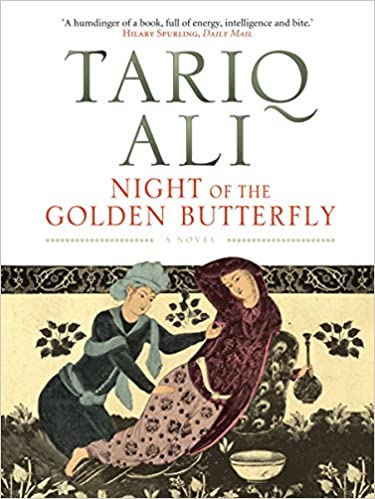The novel Night of the Golden Butterfly (2010) by eminent Marxist intellectual and author, Tariq Ali, is a narrative which paints a dystopian vision of what political authoritarianism looks like. The novel primarily explores the rise and nexus between religious fanaticism, dictatorship, majoritarianism and military-mullah-feudal nexus in Tariq Ali’s native country Pakistan, referred nostalgically to as “Fatherland” in the novel. The novel also touches other contemporary issues pertaining western imperialism, racism, immigration, Chinese Cultural Revolution, nationalism, etal.
 The main protagonist and narrator of the novel named Dara shares interesting parallels with Tariq Ali’s life; like Ali, Dara is a famous London-based writer, a cosmopolitan and left-wing critic from an affluent family in the post-Partition Pakistan. In his first introduction in the novel, Dara (named after Dara Shikoh, the seventeenth century secular Mughal poet and prince, but imprisoned by his more radical brother, the sixth Mughal emperor, Aurangzeb) is described a middle-aged author and intellectual living in London who has been now contacted by an old progressive friend named Mohammed Aflatun, known as Plato, from his student days in Punjab, Pakistan. Plato is described as a free-spirited, crazily intelligent, bawdy, and anti-clerical painter. Plato wants his biography written by Dara and it is precisely this enterprise which reunites them and their old circle of progressive friends belonging to the radical intellectual milieu of the 1960s Pakistan. It was in the 1960s Lahore where four college students namely, Dara, Zahid, Plato and Hanif (Confucius as they called him) begin their political and intellectual comradeship based on mutual Marxist yearnings. Plato reminds Dara about a “debt” he owes him and the only way to repay that was by turning the story of Plato’s eccentric life into a piece of fiction. Dara agrees on this request as put forward by his good old friend, but with the affirmation that he will narrate a multi-vocal story and give it the form of a proper piece of fiction. All the four friends and their life stories, and events associated with them are brought together after more than 40 years when Dara undertakes his project of writing. And in the course, his account, apart from his former friends and comrades, also focuses on two women: Zaynab, Plato’s mistress, and Jindie, his own first love and the titular Golden Butterfly (Sunehri Titli) of the novel. The plot neatly combines betrayal, friendship and reconciliation. One of these reunions is with his former love, Jindié, a Chinese origin Pakistani woman and her husband, Zahid, Dara’s former best friend and a staunch Marxist, who betrayed his friends and their progressive ideology to turn into a supporter of the imperialist regime of USA and its conservative policies when he became a famous doctor there. And along with this, a deep sense of nostalgia pervades the novel as the author remembers the good old cosmopolitan nature of the Pakistani society now overwhelmed by religious fundamentalism and bigotry. This deep sense of nostalgia is reflected in the novel in the following words: “Was it old friends I was mourning or an old city, an old world that had since changed so much and for the worse, a world in which expectations for a better future were always high…”
The main protagonist and narrator of the novel named Dara shares interesting parallels with Tariq Ali’s life; like Ali, Dara is a famous London-based writer, a cosmopolitan and left-wing critic from an affluent family in the post-Partition Pakistan. In his first introduction in the novel, Dara (named after Dara Shikoh, the seventeenth century secular Mughal poet and prince, but imprisoned by his more radical brother, the sixth Mughal emperor, Aurangzeb) is described a middle-aged author and intellectual living in London who has been now contacted by an old progressive friend named Mohammed Aflatun, known as Plato, from his student days in Punjab, Pakistan. Plato is described as a free-spirited, crazily intelligent, bawdy, and anti-clerical painter. Plato wants his biography written by Dara and it is precisely this enterprise which reunites them and their old circle of progressive friends belonging to the radical intellectual milieu of the 1960s Pakistan. It was in the 1960s Lahore where four college students namely, Dara, Zahid, Plato and Hanif (Confucius as they called him) begin their political and intellectual comradeship based on mutual Marxist yearnings. Plato reminds Dara about a “debt” he owes him and the only way to repay that was by turning the story of Plato’s eccentric life into a piece of fiction. Dara agrees on this request as put forward by his good old friend, but with the affirmation that he will narrate a multi-vocal story and give it the form of a proper piece of fiction. All the four friends and their life stories, and events associated with them are brought together after more than 40 years when Dara undertakes his project of writing. And in the course, his account, apart from his former friends and comrades, also focuses on two women: Zaynab, Plato’s mistress, and Jindie, his own first love and the titular Golden Butterfly (Sunehri Titli) of the novel. The plot neatly combines betrayal, friendship and reconciliation. One of these reunions is with his former love, Jindié, a Chinese origin Pakistani woman and her husband, Zahid, Dara’s former best friend and a staunch Marxist, who betrayed his friends and their progressive ideology to turn into a supporter of the imperialist regime of USA and its conservative policies when he became a famous doctor there. And along with this, a deep sense of nostalgia pervades the novel as the author remembers the good old cosmopolitan nature of the Pakistani society now overwhelmed by religious fundamentalism and bigotry. This deep sense of nostalgia is reflected in the novel in the following words: “Was it old friends I was mourning or an old city, an old world that had since changed so much and for the worse, a world in which expectations for a better future were always high…”
The novel can be interpreted as an elegiac lament on the one-time multicultural and free thinking milieu dominating Lahore and other places in Pakistan which are now under the grip of religious fanaticism. As the novel alludes to the dystopian conditions in the contemporary Pakistan: “I spoke of the country where I could not live, where people were spewed out and forced to seek refuge abroad, where human dignity had become wreckage. [A dissenting person’s] life was a living-death example of a human being putrefying in the filth that was our Fatherland…Its rulers. Scum of the earth. Blind, uncaring monsters. Fatherland needs a tsunami to drown them and their ill-gotten gains.” Faiz Ahmed Faiz’ s famous poem “Subh-e-Azadi” comes to mind.
Night of the Golden Butterfly is also shown questioning the authoritarian nationalisms (whether Sunni-Punjabi in Pakistan, Han in China or the White in the west) backed by political consciousness. The novel interrogates the process through which a sense of national identity is constructed. The construction of national identity is said to be the result of a dual dynamics–one homogenizing and the other, differentiating. Making the idea of a nation or community as homogenous, i.e. unified and single, also suggests its difference from other nations or communities. Tariq Ali, in the novel, striking at this very core of the dynamics of nationhood, shows that the idea of a nation is a misleading construction. Along with narrating the tale of contemporary Pakistan, the novel entwines the story of the nineteenth century China. The novel alludes to a Muslim uprising in Yunnan province against the genocidal policies of Han as in 1872 A.D., the Han Emperor of China ordered his troops to destroy the Muslim province of Yunnan and wipe out the Sultanate of Suleiman. The main motive behind this act was not religious or communal, but mostly political and economic including the fears of a minority gaining too much autonomy and international respect. Through this reference to the nineteenth century Chinese history, the genocide of Muslims in Yunnan, and the brute majoritarianism of its Han population, a subtle parallel is also drawn towards one of the more complex reality of Pakistan— the domination of the largest ethnic group, Punjabis, over other ethnic minorities. This is reflected in a detailed letter that Jindie writes to Dara in which she slyly remarks, “The talk of Han domination would have been brushed aside by all of you with contempt as it still is by Zahid. Perhaps the reason for this is that the Punjabis have become the Han equivalents of Fatherland, crushing other nationalities at will, but that’s your story. Better write it before the Baluch and the Pashtuns and the Sindhis produce their own” (83).
Apart from being self-reflexive in the tone, the novel also takes a hard look at the machinations of Islamophobia prevalent in the West which is often instrumentalized for strategic objectives. The novel shows that the defiant Muslim women characters like Yusufa and Zaynab not only challenge the existing repressive value systems of their native countries but also confront the western world for its hypocrisies and rampant racism and xenophobia in the form of Islamophobia while playing the “female liberation or saviour” template. Chandra Talpade Mohanty has made a powerful case against certain kinds of “reductivist Western feminist” constructions of “third world women” as a monolithic object of study.
The contest between Yusufa al-Hadid, who is described as “hijab-clad Maghrebin Frenchwoman” in the novel and Naughty Latif (who was to expose the “cruelty” of Islamic societies and build the case for more and more Islamophobia) on a French TV Show is particularly interesting where the western hypocrisy and the enterprise of Islamophobia is laid bare. The TV Show resorts to the classic blanket stereotyping about the Muslim societies and in this case, the Pakistani society in which Muslims are associated with backwardness, violence, cruel patriarchy, terrorism, suicide bombings, etal. Tariq Ali critiques this stereotyping in the most sarcastic terms:
To set the tone for this new objectivity, he [the host of the TV Show] showed the audience a ten-minute film on Naughty’s world and the society that produced her. Beards, bombs, horrific footage of Taliban touts flogging woman, statistics of honour killings, ‘balanced’ by interviews with a few good people in Fatherland, mainly women, who pointed out that most women who were put to death were killed in the family and not by fundamentalists. Then interviews with many bad people who wanted more wars, supported the drones, and accepted with sad faces that the collateral damage was a price that had to be paid for freedom. I wondered whether they would be saying that if their families had been wiped out. Intercut with all this were images of Naughty in peaceful Paris, reflecting on the difference between the two worlds. Wonderful stuff. (194)
About such frequent stereotyping of the East in the Western mass media, Salman Rushdie observes in one of his essays:
I should also mind less, were it not for the fact that The Far Pavilions, book as well as TV serial, is only the latest in a very long line of fake portraits inflicted by the West on the East. The creation of a false Orient of cruel-lipped princes and dusky slim-hipped maidens, of ungodliness, fire and the sword, has been brilliantly described by Edward Said in his classic study Orientalism, in which he makes clear that the purpose of such false portraits was to provide moral, cultural and artistic justification for imperialism and for its underpinning ideology, that of the racial superiority of the Caucasian over the Asiatic.
(Outside the Whale 1984)
Though the novel is about the dystopian conditions in Pakistan—lack of democracy, dictatorship and capitulation of the state to religious fundamentalism and majoritarianism, it can also be read as a metaphorical story of much of the contemporary world where rightwing populism, authoritarianism, racism and xenophobia is on a gradual rise.
Basharat Shameem, Assistant Professor, Amar Singh College, Srinagar, J&K

















































